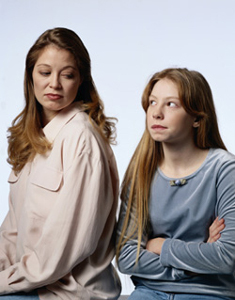Setting Rules and Consequences - 3 Simple Steps to Growing Responsible Kids

"Why should I have to clean my room, it's my room?"
"I finished my homework at school."
"That's not true; my teacher just doesn't like me."
"That's not fair!"
"I forgot."
Sound familiar? One day you wake up and the child you once knew has turned into someone you barely recognize. You've heard other parents talk about their teen or tween but now you are living with one, and it's not what you expected. Your child may be neglecting things like chores and homework or blatantly breaking rules at home and school. Whether here or there, teens and tweens need to learn that every action has a consequence.
"Do your chores!" "Clean your room!" "Do your homework!"
Count the number of times you say those words. Not only are you beginning to sound like a broken record, but your words seem to land on deaf ears.
With the heightened exposure experienced by children today comes a greater responsibility to train them to think before they act, take responsibility for their actions and make good choices. There are countless stories out there about the need to change teen behavior, but very few people offer specific ideas that you can use immediately. From where you stand right now, you may see a long road ahead. But taken one step at a time, it will begin to feel like a stroll in the park!
Sit down with your children and ask them what they feel the rules in the house need to be in order for everyone to live there happily. Interestingly enough, children quickly start thinking about their likes and dislikes and completely forget that they will also have to live by the rules. Write down all their rule suggestions. Let them know that you will review them, make additions as needed and meet with them to present the final rules. After going over the rules, ask if anyone wants to add anything or needs clarification on what a rule means. Once the rules are final, have everyone sign the rules, give everyone a copy and post the rules in a central location.
Now it's time for your children to develop consequences for breaking those rules. If your children are not used to this kind of involvement you may have to guide them, but I have always found their consequences to be harder than what I would have chosen. Once a consequence has been chosen for each rule, review them and present them at the next meeting. Have everyone sign them, then distribute and post. Now just make sure that you stick to your guns. Because your children made the rules, it decreases their arguments about following them. All you have to say is, "These are the rules and consequences you set."
Step Two takes care of anticipated behaviors, but what about the unexpected. Consequences fall into one of two categories; they can be natural or logical. Natural consequences are the things that naturally happen as a result of an action or lack of action. For example: if your child doesn't do his/her homework, the natural consequence is getting a bad grade. Logical consequences are those that are directed by you and are relevant in time, scope and severity to the infraction. For example: if you stay out past curfew, you cannot go out tomorrow.
It will sometimes be very difficult for you to allow natural consequences because you want to shield your child from pain and possibly protect yourself from embarrassment. No parent wants her child to leave the house poorly groomed or to be left back in school, but natural consequences can pack a big punch. Only you can decide your comfort with using natural consequences, but please keep an open mind.
Next time, let your child decide the consequence for his behavior. Have him come up with three consequences from which you then choose the one you want to issue. The catch is to tell him that if he doesn't come up with three appropriate consequences, you will issue the one you had in mind AND he will have to do the three they came up with.
Remember, every consequence is more than correction; it's an opportunity to teach.
by L.M. Daniels
